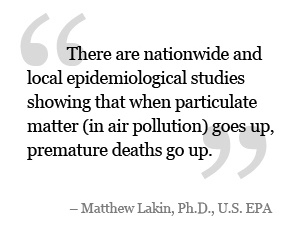Researcher Says Wood Burning Not Sustainable
A fascinating article, “Heating and Air Pollution,” discusses the disproportionate contribution of wood smoke to pollution when wood burning is used as a heat source. The author, Marcelo Mena, is the Director of the Center for Sustainability Research at Universidad Andres Bello and performs research on regional air quality and climate modeling.
The bottom line, Mena notes in a follow-up comment to the article, is that current use of wood burning in many developing countries and in the US is not sustainable because it generates orders of magnitude more particulate pollution than other fuel sources.
Mena notes that in Santiago, Chile, just 8 percent of the population uses wood burning stoves, yet the resulting soot makes up 49 percent of air pollution. This is paralleled by findings in the Bay Area, where the number of people who rely on wood stoves for heat is low, yet wood smoke makes up more than 30 percent of winter time air pollution.
Mena also notes that a stringent ban on wood burning on bad air days in the San Joaquin Valley in California led to a remarkable 44 percent reduction in the number of days when the air quality was unhealthful. “In my years working in air pollution,” Mena stresses, “I’ve never seen a single measure with such effectiveness in reducing pollution.”
What are the ramifications for clean air policies? Mena suggests that in cities, where the wood smoke pollution burden adds to that from vehicular pollution, we should think about outright bans in wood burning.




